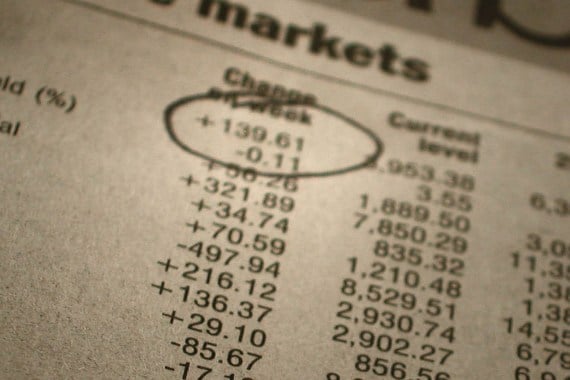Dow average sinks more than 200 points as banks slide
Global equities dropped, with the Dow Jones Industrial Average dropping more than 200 points, as a sliding oil price weighed on industry groups from banks to commodity producers and dragged down emerging markets. Treasuries rose on haven demand.
American stocks fell to the lowest in a week, while European shares dropped the most in two weeks as the U.S. Treasury secretary said Group of 20 finance ministers won't deliver an “emergency response” at their meeting this week. Crude fell through $31 a barrel in New York after Saudi Arabia scuttled speculation of a production cut. The pound weakened below $1.39 for the first time since 2009 on concern the U.K. may exit the European Union. Brazil's real fell after the nation's debt was downgraded to junk.
http://www.investmentnews.com/wp-content/uploads/assets/graphics src="/wp-content/uploads2016/02/CI104046224.JPG"
Investors got a reminder yesterday that plunging oil and concerns about slowing growth in China are still dominating sentiment in global financial markets this year. Adding to the misgivings are Britain's referendum on EU membership, Jacob J. Lew's cool response to market turbulence and growing signs the American political landscape will remain unsettled amid the race for president, as Donald Trump took another step toward winning the Republican nomination.
“Today's all about oil going down and that's just dragging the market down again,” said Sandy Villere, a portfolio manager at Villere & Co. in New Orleans, which oversees $2.6 billion. “Everybody's just laser-focused on what energy is doing and not only that, but ultimately what's going to happen with interest rates.”
STOCKS
The Standard & Poor's 500 Index fell 1.3% at 9:48 a.m. in New York, adding to Tuesday's retreat of 1.3%. The index has declined 1% in February, heading for a third straight monthly drop that would be the longest slide in more than four years. Concern that China's slowdown will hurt global growth, and that lenders will suffer as some energy producers struggle to stay solvent amid low oil prices, has dragged the S&P 500 9.8% below its all-time high reached last May.
The Stoxx Europe 600 Index slipped 2.2%, falling for a second day amid the downturn in commodity prices, disappointing earnings results and dissipating faith in central bank support. It hasn't posted two consecutive days of gains since December.
Miners fell the most, with Glencore Plc and BHP Billiton Ltd. losing more than 8 %. StatoilASA and Royal Dutch Shell Plc were among those leading a gauge of energy-related companies lower after Iran branded the plan agreed on by Saudi Arabia and Russia, the world's two largest oil producers, as “ridiculous.” Every member of the Stoxx 600 Banks Index declined.
Commodities
Oil futures slid as much as 3.7% in New York. Crude is down 17% this year on speculation a global glut will persist amid the outlook for increased shipments from Iran and brimming U.S. supplies, which are at the highest level in more than eight decades. The nation's stockpiles expanded by 7.1 million barrels last week, the industry-funded American Petroleum Institute was said to report Tuesday.
“Once again we are seeing lower oil prices halting the emerging confidence in global markets,” said Ole Hansen, head of commodity strategy at Saxo Bank A/S. “Lower oil prices continue to raise concerns about EM growth, a credit event among weak oil producers and selling from sovereign wealth funds.”
Copper led losses in industrial metals on concerns that rising stockpiles in China signal continued weak demand in the world's biggest consumer. Copper for delivery in three months fell as much as 1.4%, the most since Feb. 10, to $4,580 a metric ton.
CURRENCIES
Sterling dropped 0.9% to $1.3897, the lowest since March 2009. It also fell against the euro. The pound has been sliding all week after London Mayor Boris Johnson, one of the nation's most popular politicians, said Sunday he'll campaign for the U.K. to exit the EU in a referendum.
Lower crude prices dragged on the currencies of oil exporters Russia and Malaysia. The ruble dropped 2.2% and the ringgit fell 0.6%.
The real slid 0.7%. Moody's cut the country's credit rating to Ba2 from Baa3, with a negative outlook.
The Bloomberg Dollar Spot Index added 0.3%. Japan's yen climbed versus all of its major counterparts, strengthening 0.2% to 111.89 per dollar.
Officials from the world's biggest economies will meet in Shanghai on Feb. 26 and 27 to discuss the recent turmoil in China's markets and ways to bolster a safety net for the global financial system, according to people familiar with the agenda for the talks. U.S. Treasury Secretary Lew downplayed expectations for an emergency response to global market turbulence in an interview broadcast Wednesday with David Westin of Bloomberg Television.
“Don't expect a crisis response in a non-crisis environment,” Lew said. “This is a moment where you've got real economies doing better than markets think in some cases.”
BONDS
Government bonds climbed as the drop in oil prices dimmed the outlook for inflation, preserving the value of fixed payments on the securities.
The yield on German 10-year bonds fell to as low as 0.131%, the lowest level since April, while those on similar-maturity U.K. bonds fell six basis points to 1.367%. The yield on 10-year Treasuries slid two basis points to 1.704%.







